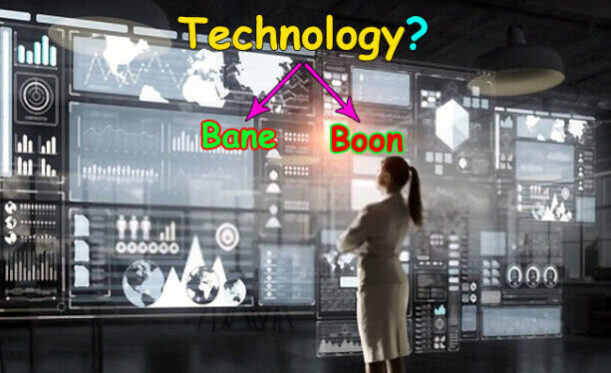Introduction
In an era marked by rapid advancements and transformative innovations, the role of technology in our lives has become a topic of intense debate. On one hand, technology has revolutionized the way we communicate, work, and live, while on the other, concerns about its potential negative impact on society and the environment have raised questions about its status as a boon or bane. This essay delves into the multifaceted nature of technology, examining both its beneficial and detrimental aspects to provide a balanced perspective on this complex issue.
The Boons of Technology
Undoubtedly, technology has bestowed numerous blessings upon humanity. The digital revolution has led to remarkable advancements in fields such as healthcare, communication, and education. Medical breakthroughs have extended our lifespans, enhanced the quality of healthcare, and improved the diagnosis and treatment of diseases. Modern communication tools have bridged geographical gaps, enabling instant global connectivity and fostering cultural exchange. Moreover, technology has democratized education, making information accessible to millions and offering innovative learning methods that cater to diverse learning styles.
In the realm of productivity and efficiency, technology has acted as a catalyst for economic growth. Automation and artificial intelligence (AI) have streamlined industrial processes, leading to increased production and reduced human error. Additionally, technological innovations have provided opportunities for entrepreneurship and job creation, especially in the tech industry, further contributing to economic prosperity.
The Banes of Technology
Despite its numerous advantages, technology is not without its drawbacks. The pervasive use of smartphones and social media has given rise to concerns about addiction, mental health issues, and the erosion of face-to-face interactions. Privacy breaches and data security breaches have exposed individuals to the risk of identity theft and surveillance. Furthermore, the rapid pace of technological advancement has led to obsolescence, contributing to electronic waste and environmental degradation.
One of the most pressing concerns is the impact of technology on employment. Automation and AI have the potential to replace human workers in various industries, leading to job displacement and economic inequality. Additionally, the reliance on technology has led to a decline in certain traditional skills and crafts, endangering cultural heritage and indigenous knowledge.
Finding a Balance
The debate over whether technology is a boon or bane oversimplifies the complex relationship between humans and technology. It is crucial to recognize that technology itself is neutral; its effects depend on how it is developed, deployed, and managed. Striking a balance between harnessing technology’s benefits and mitigating its negative consequences is essential.
Education and awareness play a vital role in ensuring responsible and ethical technology use. Society must prioritize digital literacy and critical thinking skills to navigate the digital landscape effectively. Governments and corporations must collaborate to establish robust regulations that protect individuals’ privacy, safeguard against harmful content, and address the challenges posed by automation.
Conclusion
In conclusion, technology’s impact on society is a nuanced and multifaceted issue that cannot be distilled into a simple binary classification of boon or bane. The advantages and disadvantages of technology coexist, and it is our collective responsibility to steer its trajectory towards a future that maximizes its benefits while minimizing its drawbacks. By fostering a culture of responsible technology use, promoting ethical innovation, and advocating for comprehensive policies, we can shape a world where technology truly becomes a force for good.
